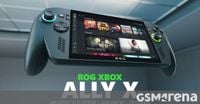Microsoft has officially entered the handheld gaming arena with its first Xbox co-branded devices: the ROG Xbox Ally and the Xbox Ally X, developed in collaboration with Asus. Announced at the Xbox Games Showcase on June 8, 2025, these two Windows 11-powered handhelds are set to launch during the holiday season of 2025 across multiple countries including the U.S., U.K., Australia, Japan, and many more.
The Xbox Ally is positioned as a "great value" option, aimed at general gamers, while the Ally X is billed as an "ultimate high-performance" machine for more demanding players. Both devices are powered by AMD processors—specifically the Ryzen Z2 A for the Ally and the Ryzen AI Z2 Extreme for the Ally X—featuring 16GB and 24GB of LPDDR5X memory, respectively. Storage options include 512GB SSD for the Ally and a roomy 1TB SSD for the Ally X, both upgradeable via standard M.2 2280 slots.
Visually, the two handhelds sport a 7-inch Full HD (1080p) IPS display with a 120Hz refresh rate, FreeSync Premium support, and Gorilla Glass Victus with DXC Anti-Reflection coating. The design takes strong inspiration from Xbox's wireless controllers, featuring pronounced contoured grips and the familiar ABXY button layout, complete with a dedicated Xbox button for quick access to the Game Bar. Notably, the Ally X includes impulse triggers, enhancing analog control precision compared to the standard hall effect triggers on the Ally.
Connectivity-wise, both models offer Wi-Fi 6E and Bluetooth 5.4. The Ally has two USB 3.2 Gen 2 Type-C ports, while the Ally X upgrades one of these to a USB4 Type-C port with Thunderbolt 4 compatibility. Both have a UHS-II microSD card slot for storage expansion and a 3.5mm headphone jack. Battery capacity differs, with the Ally sporting a 60Wh battery and the Ally X packing an 80Wh unit, catering to the higher performance demands of the latter.
What truly sets these handhelds apart is their software experience. Running Windows 11 Home, Microsoft has developed a custom "Xbox full screen experience" tailored specifically for these devices. This interface boots directly into a controller-optimized environment that aggregates games from various PC storefronts—including Steam, Epic Games Store, and the Microsoft Store—as well as the Xbox Game Pass subscription library. The system defers non-essential Windows processes to allocate more resources to gaming, reportedly freeing up to 2GB of RAM, which should translate to better performance and smoother gameplay.
This approach addresses a major pain point observed in prior Windows-based gaming handhelds like the ROG Ally X and Lenovo Legion Go, where the standard Windows desktop experience hampered performance and user experience on small screens. Microsoft’s re-engineered Xbox app and Game Bar have been optimized for handheld use, integrating Asus’ Armoury Crate for hardware management and offering a seamless way to switch between apps, games, and chat.
Microsoft’s vision is clear: to extend the Xbox ecosystem further into the PC gaming handheld space and challenge the dominance of Valve’s Steam Deck, which runs on the Linux-based SteamOS. While the Steam Deck has sold around 4 million units, the Nintendo Switch’s staggering 150 million sales highlight the vast gulf between niche PC handhelds and mass-market devices. By offering a Windows-based handheld with Xbox branding and ecosystem integration, Microsoft aims to bridge this gap.
Industry experts like Piers Harding-Rolls from Ampere Analysis have praised the partnership with Asus, noting it as a sign of Microsoft’s increasing commitment to PC gaming and its intent to maintain Windows as the dominant gaming platform. Harding-Rolls points out that Windows PC handhelds sold 1.2 million units by the end of 2024, signaling a growing market that Microsoft is eager to capitalize on.
Game compatibility is another strong suit. Xbox CEO Sarah Bond confirmed that every game announced at the Showcase supports Xbox Play Anywhere, allowing players to purchase once and play across PC, console, and cloud. Titles such as "Persona 4 Revival," "Hollow Knight: Silksong," "Call of Duty: Black Ops 7," "Gears of War: Reloaded," and "Final Fantasy XVI" are among those highlighted. Additionally, Microsoft collaborated with Roblox to launch an optimized version for these handhelds, further broadening the gaming library.
Despite these promising features, some concerns linger. The reliance on Windows 11, even with optimizations, raises questions about battery life and performance compared to SteamOS-powered devices. Past experiences with Windows handhelds showed that the OS could introduce lag and inefficiencies, although Microsoft’s efforts to minimize background activity could mitigate this. Battery life remains a crucial factor; while the Ally’s 60Wh and Ally X’s 80Wh batteries represent improvements over previous models, heavy gaming sessions on a Windows device can still drain power quickly.
Pricing remains the biggest unknown. The original Asus ROG Ally launched at $600, and the cheapest Steam Deck model retails for $399. Given the Ally X’s high-end specs and features like USB4 and Thunderbolt 4, it’s expected to be priced at the higher end, potentially between $800 and $1,000. Microsoft has yet to announce official pricing or pre-order dates but has promised to reveal them in the coming months. The company also plans to release accessories such as cases and device mods.
Launching in a market freshly stirred by the Nintendo Switch 2’s arrival, Microsoft’s entry with the ROG Xbox Ally series adds a new dynamic to handheld gaming. While the Switch continues to dominate with its mass-market appeal and exclusive titles, the Xbox Ally devices offer PC gamers and Xbox fans a powerful, versatile alternative that blends the best of console and PC ecosystems.
Whether Microsoft can carve out a significant share of this niche will depend on pricing, software optimization, and the overall user experience. But with the backing of Asus’s hardware expertise and Microsoft’s gaming ecosystem, the ROG Xbox Ally and Ally X could well redefine what handheld gaming means in 2025 and beyond.






